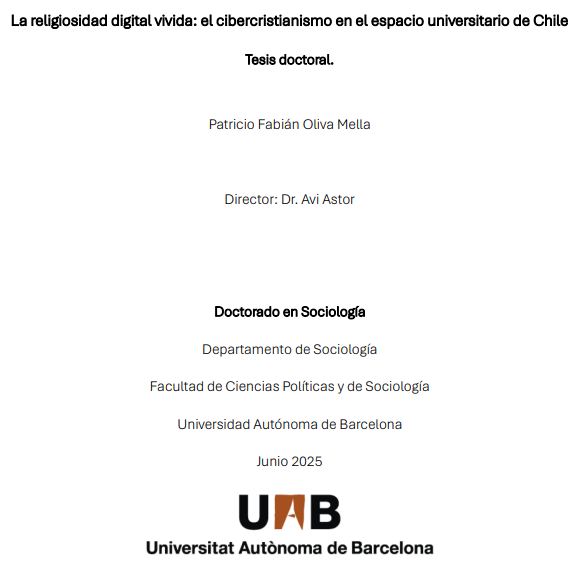Doctoral thesis defense of Patricio Fabián Oliva
Lived digital religiosity: cyber-Christianity in Chilean universities

Lived Digital Religiosity: Cyber-Christianity in a Chilean UniversityThis doctoral research examines the emergence and configuration of digital religiosity within two university communities in Chile—one Catholic and one Evangelical. It posits that online religious engagements correspond with an active and sustained reconfiguration of offline religious practice, whose dynamism is both generated and conditioned by interactions within virtual groups.To address this issue, the thesis articulates a methodological approach termed "phenomeno-ethnography." This approach combines micro-ethnography with phenomenology in order to apprehend situated "doing" and ritual praxis, on the one hand, and to access the "saying" and "feeling" of lived experience through in-depth interviews, on the other.The findings reveal a process of social construction that does not begin with an impulse toward religious innovation, but rather with the functional needs of group coordination. The transition from mere utility to a cohesive community and innovative religious practice is made possible by the emergence of trust. Paradoxically, this trust is consolidated through shared criticism of the original (offline) religious institution. Such controlled dissent, expressed within the safe space of the virtual group, functions as a rite of passage that solidifies collective identity and establishes a degree of distance from traditional authority.Upon this foundation of trust, the participants establish themselves as "collective architects," constructing a religious social reality with its own logic. This process aligns with Berger and Luckmann's (1991) model of externalization, objectivation, and sedimentation. The young adults externalize their experiences through digital artifacts (memes, short videos, fragmented texts), objectify them through collective negotiation, and sediment them into a symbolic universe that, despite the fluidity of the medium, acquires a notable solidity. The result is a "chiral" identity that includes elements of its origin but also incongruencies that make it unique.This constructed reality operates within defined socio-technical limits. The research identifies three main limitations: a resistance to technology perceived as "complex"; the "tyranny of brevity," which favors formats of rapid consumption; and the rejection of platforms considered "old" or institutionally contaminated, such as Facebook. The most significant exclusion, however, is Artificial Intelligence (AI), which is rejected on ontological grounds for its perceived lack of "soul," feeling, and human fallibility—attributes considered indispensable for an authentic religious experience. AI is deemed "blasphemous" by the Catholic group and "apocalyptic" by the Evangelical group as a bulwark to protect human hermeneutical agency.In conclusion, the thesis posits that these young adults construct a "socio-technical greenhouse": a protected digital ecosystem where it is possible to cultivate personal and interpersonal faith, apart from institutional control and the vastness of unfiltered cyberspace. Resistance to AI is the definitive act of defending this greenhouse, an affirmation that the locus of the sacred remains, unyieldingly, within human experience.
Date: 28/10/25
Hour: 13,30h
Sala de Graus (Fac. Ciències Polítiques i Sociologia)